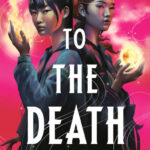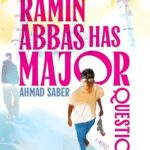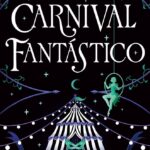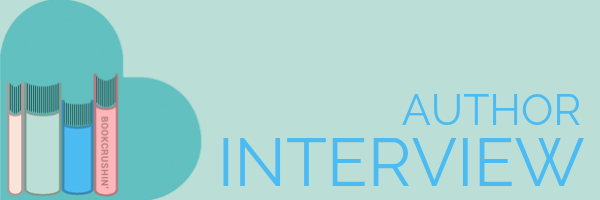
Author Interview: Empty Heaven by Freddie Kolsch
In Empty Heaven, Freddie Kolsch invites us into a New England summer that feels equal parts idyllic and rotten beneath the surface, a place where nostalgia curdles into dread, secrets seep through old stone walls, and queer friendship becomes a fierce, bright light against the darkness. We talked with Freddie about the region’s hidden cruelties, the monsters that thrive in the spaces between trust and betrayal, and why horror stories are sometimes the truest love letters of all. Check it out and pick up Empty Heaven, out August 26th!
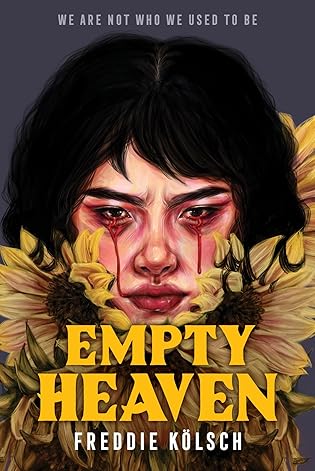
Empty Heaven
by Freddie KölschBookshop
Goodreads
Interview with Freddie Kolsch
Empty Heaven has this eerie blend of golden nostalgia and creeping dread, like a New England summer curdling into a nightmare. What drew you to set a story of love and horror in a place that feels both postcard-perfect and deeply wrong?
Okay, so I was born in Connecticut and now live in Massachusetts. I’ve been to most of the contiguous U.S., and every single bit of it feels both…how do I put this…it feels both esoterically unified and profoundly disparate from every other single bit of it. I think that could be down to the enormous size of the country itself, the emphasis on state identity, the wonderful multifaceted quality that immigration has gifted us with (you know, back when immigration was something the government wasn’t explicitly demonizing), myriad reasons. So I’ve traveled the country, but I’ve always come home to New England. And New England very much feels like its own thing.
As a gay kid living here I believe I was relatively safe. I’ve experienced discrimination, which, especially as a young person, gave me this terrible feeling of impotent rage, and I’ve been teased and commented on or about innumerable times. But I never once felt like I was in physical danger. For the most part we’re firmly in liberal territory…but a safe haven can still be cruel.
I witnessed a great many instances of this growing up in a family of mixed ethnicity: the silent double standard. It’s paradoxical. We vote blue but have way more white people (something like 80%) than the deep red southern places we scorn (around 60% max). Everyone is eager to tell you about how their family was full of abolitionists, or ask you if you’ve seen that episode of Black Mirror with the romantic lesbians in it (‘It was so beautiful!’ is the usual comment), but those same people are only close friends with other straight cis wealthy white people, or are proud of the fact that their ancestors came over on the Mayflower. That’s a generalization, of course, but one that I think other New Englanders will acknowledge has some merit. The history of discrimination here is hidden in some ways, because it’s considered distasteful. It is distasteful, obviously, but it still happened.
The first time I ever read Jackson’s “The Lottery” was pre-Google (actually my father read it aloud to me, laughing at how bored I was through most of it and how my eyes got wider and wider at the end), and I never looked anything up about it, just assumed that it took place in the Deep South or else some isolated region of the Midwest…because of course it did, right? That was ‘what people were like out there’. But no. Shirley actually wrote “The Lottery” to hold up a ghastly mirror to the antisemitic treatment of her Jewish husband while he was teaching at Bennington. In Vermont. It can definitely happen here.
I love New England. I know what I’ve said above might seem really condemning, but I think to truly love anything, especially something as complex as a place, you have to be aware of the flaws. And the flaws here are inextricably tied to the bloody history of colonialism and chattel slavery. The internment and genocide of the indigenous peoples. The terrible things that we are trying desperately to bend the moral arc of our universe away from. So with Empty Heaven, it made perfect sense to me that the horror of the setting is inextricably entwined with the allure: the town of Kesuquosh is basically Stars Hollow but (much) more isolated. Old stone walls and sheets of brilliant autumn leaves, deep silent forest and the smell of woodsmoke. Everything beautiful, everything aesthetic. The perfect little Massachusetts town. And it’s not conservative, it’s not some place that’s draped in Confederate flags or full of shop owners who would refuse to make you a gay wedding cake. It’s a place where everyone says the right thing. They say the right thing and yet they still…still…value conformity. Are made uncomfortable by deviations from the norm.
I think this is a kind of hypocrisy that teenagers are very sensitive to and thus pick up on relatively early, so it makes sense to have a place in a YA book that embodies those contradictory qualities. Granted, this is a genre book, so that conformity is enforced by powers beyond the control of the average person, but isn’t it always? I think so. And our job, as human beings, is to break free.
Without spoilers: Darian’s monster feels as intimate as it is terrifying. What was the emotional seed that birthed that character? Was it fear, grief, obsession, something else entirely?
This is such a hard question to answer without spoilers, but I will try my best…
So when teenagers are, you know, teenagers, especially ones who are particularly intelligent or emotionally astute, I feel that they tend to think of themselves as adults. Actually, as people who know more than adults: like being a grownup is having some kind of veil thrown over your eyes that makes you do dull things like ‘obey laws’ and ‘go to work’, while they are truly untamed creatures outside of society, both more perceptive and more iconoclastic than adults could ever be. And unlike adults, they’ll never turn into everybody else. I believe that this is such a pervasive viewpoint among adolescents that a decent chunk of them would be very irritated with me for even saying this (I would have).
And I think the sentiment holds truth within itself. Hormonally we will never be as heightened or as volatile again in our lives. There is something about that era of physical and intellectual maturation that sets teens apart from everyone else, which likely factors into why it’s so fun to write and read YA. But in other ways, those little iconoclasts are deeply naive and incredibly vulnerable, much as they might revile me for pointing it out. And Darian, the protagonist of Empty Heaven, is just as smart and perceptive as every other teenager who ever thought they knew more than any adult alive.
The danger, then, comes from the outside. Because there are adults who are looking to prey upon the vulnerabilities of young people, and some of the worst of them do it in a way that works with the mindset of adolescence. I think everyone remembers the ‘Cool Adult(s)’ from their youth, right?
They knew other adults were full of crap.
They got it.
They would give you drugs as long as you ‘didn’t tell anybody’, or take you places you shouldn’t go, or help you do things you shouldn’t do. A bit of trouble is okay, but it should be teens facilitating their own trouble, not adults. Our job is to protect kids from their own worst impulses, not encourage them. And yeah, I think that makes us seem boring to younger people…as it should.
Some of the adults who engage in these behaviors are essentially harmless. Fun Moms or Fun Dads who still feel like kids themselves, and don’t want to be seen as lame. They’re immature, but not predatory. Not abusive.
But the abusers are undoubtedly there. They’re there, and they can be fun to be around. For a while. But eventually they start to make demands of the teens they keep company with. And those teens sometimes acquiesce…because they feel backed into a corner, because they don’t want to let the Cool Adult down, because they’re convinced that they manipulated the situation to get this exact outcome. Whatever the reason, they end up trapped, and when they do get free, they sometimes come away with scars. And it’s unutterably sad to me that some of them think they put those scars there themselves.
There’s a great podcast by Jamie Loftus that’s just called Lolita Podcast. It purports to be a history of Dolores Haze, the titular character of the novel Lolita, and of her representation across media. But it soons spins out into something much wider; a portrait of a culture that is determined to place the burden of adult abuse on abused children. The frustration and anger that I feel about the reality of that, and how insidious and widespread the belief is that kids can ‘tempt’ adults into abusing them, is what led me to write about a character who believes she played a crucial part in making a monster that she scarcely survived, and a haunting that she never wanted to endure—but feels profoundly responsible for.
This book reads like a love letter to queer friendship in the face of unspeakable things. Was there a moment while writing that made you sit back and go, “Oh, this is what the story is really about”?
I read a decent amount of author interviews, and the conclusion I’ve drawn from them is that pretty much every writer besides me is brilliant and organized, and I am the flakiest, least-prepared novelist of all time. People do stuff that seems completely wild and unreachable. Making pinterest boards? Making OUTLINES? Knowing most of what’s going to happen before they write it??? These are amazing stops on a creative train that winds through a country where I will never step foot. I start books with a dream and a single page from my notes app that has some first names and surnames I think ‘sound good’. Someday I’ll get really mature with it and have a plan…hopefully soon, because I’m about to turn 38 and I am still feeling zero impulse to nail down a process that makes sense.
Admittedly I do normally have one solid idea in my head when I start a project: the feeling that I want people to get from a specific scene somewhere in the back third of the book. In more than one manuscript this has also been the scene with the title drop. I’ve never been averse to that particular brand of cheese; a dramatic title drop gets me every time.
In Empty Heaven, the scene (sans title drop) was the last one. I wrote the final line of the book first and then left it at the very end of my manuscript-in-progress until I felt like the story had earned that ending. Hopefully it has!
But in answer to your thoughtful question, I suppose that I still am not entirely sure that I know what the book is ‘about’, in any kind of abstract thematic sense. Human connection, maybe, or the importance of not putting blind trust in authority figures. The profound importance of bodily autonomy, and the way that people are divested of said bodily autonomy by authoritarians for the so-called ‘greater good’. Or the current frightening state of things for queer people—particularly trans people—and how the greatest part of our community has always been our collective bravery in the face of persecution. Not just for ourselves, but for each other. So yes, I think it’s pretty astute to say that this is a love letter to queer friendship in the face of unspeakable horrors.
But when I’m writing, I’m not thinking about any of that. Those are just things I believe. I’m thinking about how to keep it entertaining, how to provoke a reaction, how to make people feel something. Literature can teach incredibly important lessons. But it can also offer an escape from reality, if only for a little while. My favorite books have always felt like that…a curtain pulled back to reveal a marvelous secret world that I can get lost in, accompanying the characters on a journey that feels realer than real things. I want the book hangover, the slow bleed back into reality. I don’t think I’m qualified to write the kind of books that teach people life lessons, but it is my greatest pleasure to entertain them. To be allowed to carry readers away for a span of time, however brief. Before I am a writer, I am a reader. And I love other readers, and I want to make them happy (and sad, and angry, and scared, and on and on).
I guess the theme of everything I write is ‘trying to make you feel something’, and to do that I’m drawing from the well of my own experience…taking from the things that make me feel something. No matter what I do, my beliefs creep in. Which is kind of wonderful.



